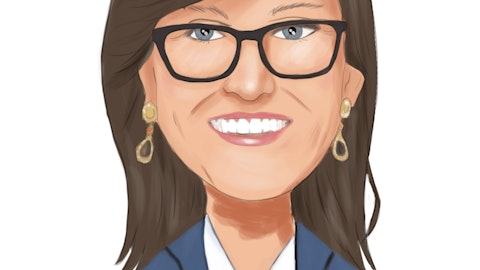Allot Ltd. (NASDAQ:ALLT) Q4 2023 Earnings Call Transcript February 15, 2024
Allot Ltd. misses on earnings expectations. Reported EPS is $-0.43 EPS, expectations were $-0.14. ALLT isn’t one of the 30 most popular stocks among hedge funds at the end of the third quarter (see the details here).
Operator: Ladies and gentlemen, thank you for standing by. Welcome to Allot’s Fourth Quarter 2023 Results Conference Call. All participants are present in listen-only mode. Following management’s formal presentation, instructions will be given for the question-and-answer session. As a reminder, this conference is being recorded. You should have all received by now the company’s press release. If you have not received it, please contact Allot’s Investor Relations team at EK Global Investor Relations at 1-212-378-8040 or view it in the news section of the company’s website at www.allot.com. I would now like to hand over the call to Mr. Kenny Green of EK Global Investor Relations. Mr. Green, would you like to begin, please?
Kenny Green: Thank you, operator. Welcome to Allot’s Fourth Quarter and Full Year 2023 Conference Call. I would like to welcome all of you to the conference call and thank Allot’s management for hosting this call. With us on the call today are Mr. Erez Antebi, President and CEO; and Mr. Ziv Leitman, CFO. Erez will provide an opening statement and summarize the key highlights of the quarter. We will then open the call to the question-and-answer session, and both Erez and Ziv will be available to answer those questions. You can also find the highlights, the financial highlights and metrics, including those we typically discuss on the conference call in today’s earnings press release. Before we start, I’d like to point out the Safe Harbor statement.
This conference call contains projections or other forward-looking statements regarding future events or the future performance of the company. Those statements are only predictions, and Allot cannot guarantee that they will, in fact, occur. Allot does not assume any obligation to update that information. Actual events or results may differ materially from those projected, including as a result of changing market trends, delays in the launch of services by our customers, reduced demands and the competitive nature of the security services industry as well as other risks identified in the documents filed by the company with the Securities and Exchange Commission. And with that, I would now like to hand the call over to Erez Antebi, CEO. Erez, please go ahead.
Erez Antebi: Thank you, Kenny. I’d like to welcome all of you to our conference call. Thank you for joining us today. I would like to start with a summary of 2023. Our fourth quarter revenues were $24.3 million, 26% lower than the comparable quarter last year. Our total revenues for the full year 2023 were $93.1 million, 24% lower than our revenues in 2022. In December 2023, our SECaaS ARR was $12.7 million, 20% higher than our SECaaS ARR in September 2023 and 38% higher than our SECaaS ARR for December 2022. Our cash and equivalents as of December 31st, 2023, were $54.9 million, down from $86.4 million at the end of 2022. Our backlog, our backlog as of December 31st, 2023, was $58.8 million, down from $87.7 million at the end of 2022.
This includes a reduction of approximately $26 million of previous year’s recorded booking we removed from the backlog after applying a new and more stringent framework. Our total FTE or full-time employee count as of December 31st, 2023 was 559, down from 749 at the end of 2022. We expect Q1 2024 to end with approximately 510, which is a reduction of about 35% compared to when FTE peaked in September 2022. Our non-GAAP operating loss for the year 2023 was $55.2 million compared to $23.1 million loss for 2022. The operating loss in 2023 includes approximately $23 million of reserve for credit loss as we already reported in previous press releases. The transition of the business into SECaaS recurring revenue model has proven to be slower than we originally anticipated.
During 2023, two large operators we expected would launch services, one in North America and one in Europe, decided to cancel their launches for now due to their own internal issues. These cancellations were the main reason for our 2023 SECaaS revenues but whereas 2023 SECaaS revenues ended up lower than we had expected at the beginning of the year. In addition, our core DPI business is experiencing macro-related headwinds. Budget tightening by both governments and CSPs led to lower 2023 smart bookings and revenues than we expected at the beginning of the year. After reassessing our ability to collect on several deals we had signed in previous years, we took a significant reserve for credit loss. I will emphasize that we have not given up on these debts and are continuously working to secure their payments.
As a result of these issues, our negative net cash flow was $31.5 million. We went through several rounds — we went through several rounds of cost cutting and restructuring through the year and ended 2023 with a significantly reduced cost base. 2023 was extremely disappointing for us all. We have made significant changes in the company as we look to drive improved results going forward. All of us, our board, the management team and myself personally are all fully committed to turning the situation around. We are committed to doing whatever is needed to stop the losses and cash lead in 2024 and put Allot on the track for profitable growth. I would like to turn now to discuss the changes we made in Allot and what to expect going forward as a result.
Over the past couple of years, there were several changes to our Board. David Reis, joined as our new Chairman. Cynthia Paul, Raffi Kesten and Efrat Makov, joined the Board as well. Several long-serving board members stepped down, including Yigal Jacoby, who is a Co-Founder of Allot and until recently was our Chairman, as well as Itsik Danziger and Manuel Echanove. I want to take this opportunity to thank the various board members. I would like to especially thank and acknowledge Yigal Jacoby, whose contribution to Allot was immeasurable. As we announced in July, given the challenges facing our business, the Board formed an executive committee that has been working with management to identify and recommend opportunities for further improvement with a focus on driving sustainable profitability and enhancing shareholder value.
Management, together with the executive committee worked together to form the budget and operating plan for 2024. As I stated earlier, we had several rounds of cost cutting, primarily by reducing headcount. Our FTE is down from a peak of 770 in September 2022 to 559 at the end of 2023. I expect our FTE to be around 510 by the end of Q1, about 35% lower than when it peaked in September 2022. At a high level, our plan for the company in 2024 is to reach breakeven, while also investing in the business to drive profitable multiyear growth. As you know, Allot operates in two business lines, Allot Smart and Allot Secure. On the Allot Smart front, while we continue to see growing interest globally from governments as they look to block illegal activities such as drug trafficking, child pornography and terrorism.

Our CSP and enterprise businesses remain soft. While some of the weaknesses due to cutbacks in spending by governments and CSPs, we also need to continue shifting our resources and focusing toward developing countries and governments as developed countries and enterprises embrace the cloud. On the Allot Secure front, while spending by CSPs remains challenging and deployments are taking longer than we previously expected, our SECaaS revenues continue to grow double digits with a strong customer base. We’d like to discuss now our Allot Smart business. I believe we have a very strong product. We are winning many of the new greenfield opportunities we see i.e. CSPs that have no DPI and wish to add one. In multiple CSPs, we are replacing our competition where the opportunity arises.
This is true for some CSPs in EMEA, APAC and North America, and this is also true in our enterprise business. The decision to replace an installed and working DPI system is not common, since it is a big and expensive decision for a CSP. But when they have decided to do so, it historically has resulted in market share gains for Allot. We have had significant challenges with collection in several large deals. As a result, we modified our sales compensation and accountability procedures to emphasize collection and significantly reduce the chances of such problems occurring again. I would like to discuss our 2024 plan for Smart. We took a conservative view of our planned bookings and revenues. Our approach was built bottom-up segment by segment and region by region from the backlog, expected maintenance and support contracts, small expansion deals and large deals with a conservative success probability.
Entering into 2024, we have a significantly larger pipeline of large deals in several geographies in the government business and in Allot Smart opportunities in low ARPU countries. As part of our plan, despite the reduction in overall resources due to cost-cutting initiatives, we have increased resources for Allot Smart sales in several areas where we see a strong pipeline. In addition, we have identified several market segments we have not focused on historically where we see a need for our solutions. These include certain specific use cases for the fixed wireless access needs and small Tier 3 or 4 CSPs. We allocated resources to go after these market segments. And while we do not expect significant sales in 2024 due to the long sales cycle, we feel it can help make a difference for us in the years ahead.
We’d like to discuss now our Allot Secure business. I believe in Allot Secure, we have a very effective and highly differentiated product. We are the leaders of network-native security solutions for the mass market. The clearest evidence of our leadership is a significant list of marquee customers who have launched network-native security services for their customers. Verizon, Vodafone, Jio, Telefonica, Hutchison, PPF Group, Far EasTon, our strong customer base is a testimony to the quality of our solution. While the relevant network-native security market for CSPs is developing slower than we had originally hoped and expected, we are experiencing strong double-digit growth. This business remains our growth driver into the future, and we believe we are well positioned with existing customers and potential new customers.
To ensure staying power, we reduced our expenses to reduce cash burn while waiting for the market to catch up. We are taking a conservative approach as we plan for 2024. While we expect to have new SECaaS launches in 2024, we built our internal revenue forecast to rely almost entirely on the revenues we expect to see from our current launched customers with their existing go-to-market. We will be emphasizing working with existing customers, in order to expand the customer base to whom the services are offered and to make for more aggressive go-to-market strategies. As we have discussed previously, for new SECaaS customers, we are focusing on a select number of interesting opportunities. One exciting new launch in 2023 was, of course, Verizon business, which has successfully launched its network-native security service, incorporating Allot Network Secure.
The launch is going well. The number of customers is growing, and we are discussing with Verizon’s several expansion opportunities to different customer segments. While we cannot be assured of our success in adding additional customer segments, I believe Verizon is the largest signed SECaaS opportunity for Allot. We remain excited about our SECaaS opportunities as operators continue to be interested in launching network-based security service, and we have a differentiated, scalable solution for CSPs. Looking ahead, I want to summarize our expectations for 2024. Reaching profitability is our main goal for 2024. Accounting for what we consider an achievable revenue target together with a significantly reduced cost base, we expect to break even on our non-GAAP operating profit for the full year.
As there is seasonality in the year, with the second half typically better than the first half, we expect to start with some loss in the beginning and to make up for it in the second half. In terms of cash, we expect not to burn cash in 2024 as a whole. We expect our cash will initially continue to go down and bottom out at around $50 million, after which it will start going up to reach a similar cash level at the end of 2024 as we had at the end of 2023 i.e. $55 million. We expect our SECaaS revenue to continue to grow sequentially quarter-over-quarter throughout 2024. We have decided that this year, we will not be providing further guidance for the yearly or quarterly numbers. To summarize, we have made the tough decisions necessary to right-size our cost structure to provide us with staying power, given that SECaaS is taking longer to scale than we had initially projected.
We have scalable proven products. We have a strong customer base. It is time for us to execute and reallocate resources to the best ROI opportunities to drive sustainable profitable growth. And now I would like to open the call for Q&A, and Ziv and myself will be available to take your questions. Operator?
Operator: Thank you. Ladies and gentlemen at this time we will begin the question-and-answer session. [Operator Instructions] The first question is from Nehal Chokshi of Northland Capital Markets. Please go ahead.
See also Jim Cramer’s 11 Latest Stock Picks and 11 Best Regional Bank Dividend Stocks to Buy.
Q&A Session
Follow Allot Ltd. (NASDAQ:ALLT)
Follow Allot Ltd. (NASDAQ:ALLT)
Receive real-time insider trading and news alerts
Nehal Chokshi: Yes. Good morning. Erez, you talked about how you need to shift focus towards CSPs and emerging markets as opposed to mature markets, because I guess, CSPs and mature markets are starting to embrace the cloud, and that makes for, I guess, less hurdle grounds for you guys to hunt your deals. Any double click on that, that commentary there?
Erez Antebi: Yes. I think that CSPs in developed countries are starting to embrace the cloud. And though under — we see very few greenfield opportunities in — for DPI in developed countries. On the other hand on — in developing countries — sorry and another important point is that in most developed countries the use cases sorry the way that the operators are selling, for example, mobile services are flat fees, all you can eat, 50 gig a month capacity do whatever you like, things like that. In developing countries, where bandwidth is still a lot more expensive and ARPUs are much lower. There are still use cases like policy-based charging, social networks free on the weekend and things like that. So we see they’re both much more significant growth in the terms of operator customer base.
We see a broader set of use cases that require DPI. And we see there are simply more opportunities. So it’s not that we’re abandoning developed countries, but we’re shifting some of our resources to developing countries and lower ARPU countries because that’s where we see more opportunity for DPI.
Nehal Chokshi: And what about the refresh opportunity within mature markets? How is that looking?
Erez Antebi: Refresh opportunities within, sorry, could you repeat that?
Nehal Chokshi: Within the mature markets, within the existing customers. Is there a refresh with mature market customers?
Erez Antebi: There is some — there is some, but it’s less than what it was, say, five years ago. But we’re just seeing more opportunities elsewhere. What we are seeing in developed countries is we’re seeing new use cases, mostly really around fixed wireless access, both by the large carriers and by smaller carriers. And that’s why I said that we’re looking around at different use cases that fixed wireless access carriers and Tier 3 and 4 carriers in these mature markets are going to use. But that’s not a segment that we were focusing on in the past. So we’ll be focusing on it more now. And like I mentioned in the — in what I read earlier, I don’t expect that to bring significant revenues already in 2024, because of the longer sales — long sales cycle that it takes. So I expect that we’ll see the fruits of that more in 2025 and beyond. But we do see a need there.
Nehal Chokshi: The fruits of investing in emerging markets will be both more encounter ’25, is that correct?
Erez Antebi: No, no, no. No, no. I’m sorry. I missed — no, I didn’t explain myself. I said that in mature markets, high ARPU markets, okay, Europe, North America, et cetera, we do see new use cases coming up for fixed wireless access carriers and for smaller operators, Tier 3 and Tier 4 operators. These are areas that we did not focus on in the mature markets until now. So we’re putting resources to focus on those selling into those markets in mature markets and to those segments today. But I expect since the sales cycle are long that we won’t be able to conclude significant revenues from that in 2024, and we’ll see the fruits of that in 2025. In developing countries, low ARPU countries, I fully expect to see a business continuing to grow in 2024.
Nehal Chokshi: Got it. Understood. Sorry, I misunderstood, not you misspoke. And on encounter ’23 basis, what percent of your DPI revenue came from emerging markets?
Erez Antebi: And Ziv, maybe you have the numbers?
Ziv Leitman: I don’t have the exact numbers, but what we do disclose that in 2023, about 60% of the business of the revenues derived from EMEA, which is developed and developing countries; 18% from America and 22% from Asia.
Nehal Chokshi: What I’m trying to establish is that the sales portion in the emerging market, is that already an established sales portion where you already have established that you can sell your DPI market into these low markets?
Erez Antebi: It is established. It’s not new for us. We’ve been selling there in ’23 and even before, and we will — and I expect that we will sell more in — sorry, in ’23 and before that, and I expect that we will sell more in 2024.
Nehal Chokshi: And so how does the overall DPI pipeline look like today relative to 10 to 12 months ago?
Erez Antebi: I think it looks significantly stronger. And like I said I think we have — we see that a stronger pipeline of large deals actually both for governments and for emerging market opportunities.
Nehal Chokshi: Okay. Great. Thanks. I’ll leave the floor.
Erez Antebi: Thank you.
Operator: The next question is from Rory Wallace of Outerbridge Capital. Please go ahead.
Rory Wallace: Hi, Erez and Ziv. I was just wondering if you could comment a bit further on that increased pipeline that you’re seeing in the DPI business or the Smart business? And specifically, are you seeing any improvement in close rates or actual large deal closures? I know the pipeline progress is encouraging, but there were definitely issues over the past couple of years with deal slippage. So just curious if you have a sense if the market is returning to healthier behavior, specifically with the customers you’re targeting?
Erez Antebi: I don’t think that we can — I think it’s premature for me to say that the market is getting much healthier and we’re seeing better close rates. I think it’s still taking a long time to close. I do see a larger pipeline of large deals that I definitely see, but I would be cautious and wait on commenting whether these deals will start closing faster than they have during this year or something like that. I’m not sure yet. I’m hopeful, but I’m not sure.




